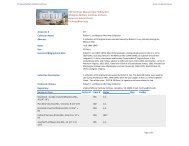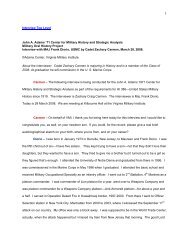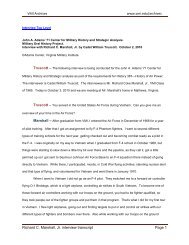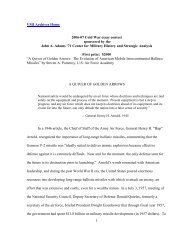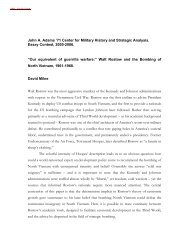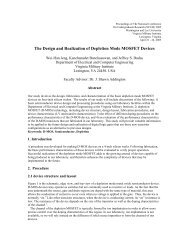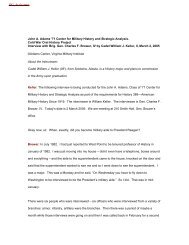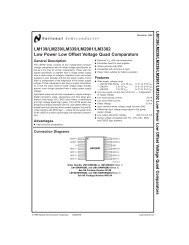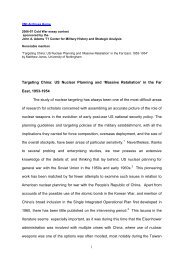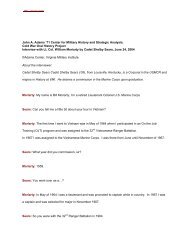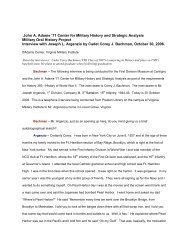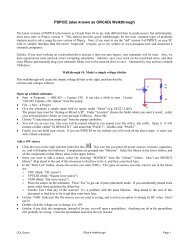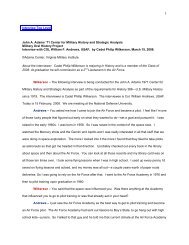Academic Catalog - Virginia Military Institute Admissions
Academic Catalog - Virginia Military Institute Admissions
Academic Catalog - Virginia Military Institute Admissions
Create successful ePaper yourself
Turn your PDF publications into a flip-book with our unique Google optimized e-Paper software.
<strong>Virginia</strong> <strong>Military</strong> <strong>Institute</strong><br />
12-13 <strong>Catalog</strong>ue<br />
and supporting equipment that facilitate warfighting at the Strategic, Operational, and Tactical<br />
level of warfighting. The student will use the information provided in these classes to build<br />
a foundation of knowledge for decision-making and further examination of the factors that<br />
affect amphibious warfare.<br />
NS 304. USMC SMALL UNIT LEADERSHIP, WEAPONS, AND TACTICS<br />
2 credits<br />
Marine option Scholarship, College Program (AS), and contracted PLC/OCC candidates.<br />
The purpose of this class is to prepare Marine Corps OCS bound cadets for the academic,<br />
moral, and physical challenges they will face during the upcoming summer. The subjects<br />
covered include operation orders, small unit tactics, leadership principles, Marine Corps<br />
history, customs and courtesies, and weapons. This class focuses on mastery of the tasks<br />
that will be required for successful completion for marine Corps Officer Candidates School.<br />
In addition, the development of effective communication skills, command presence, peer<br />
leadership, time-compressed decision-making abilities, and general military subjects will<br />
also be evaluated. The students will apply this knowledge for successful graduation of<br />
Officer Candidates School.<br />
NS 308. NAVAL ENGINEERING<br />
2 credits<br />
Navy option. This course provides the student with a detailed study of ship characteristics<br />
and types. Including ship design and control, propulsion, hydrodynamic forces, stability,<br />
compartmentalization, and electrical and auxiliary systems. Also included are basic concepts<br />
of the theory and design of steam, gas turbine, and nuclear propulsion. Corequisite; NS 318.<br />
NS 309. NAVAL WEAPONS SYSTEMS<br />
2 credits<br />
Navy option. This course introduces the student to the theory and employment of weapons<br />
systems, including the processes of detection, evaluation, threat analysis. Weapon selection,<br />
delivery, guidance, and explosives. The student will also become familiar with fire control<br />
systems and major weapons types, including capabilities and limitations, physical aspects<br />
of radar and underwater sound, and facets of command, control, and communications as<br />
means of weapons system integration.<br />
NS 313. AMPHIBIOUS WARFARE LAB<br />
0 credits<br />
Marine option The purpose of the lab is to provide the student further understanding of<br />
the fundamentals of Amphibious Warfare through the review of case studies and practical<br />
application of the principles learned in the core class. In addition, subject such as introductory<br />
Marine Corps customs and courtesies, leadership, traditions, and tactical decision games<br />
will supplement the learning environment.<br />
NS 314. MARINE CORPS SMALL UNIT LEADERSHIP,<br />
WEAPONS, AND TACTICS LAB<br />
0 credits<br />
Marine option Scholarship, College Program (AS), and contracted PLC/OCC candidates.<br />
The purpose of the lab is to provide further mastery through practical application of the<br />
subjects presented in the core curriculum. This included communication and decisionmaking<br />
evaluations, assessment of peer leadership skills, land navigation, military drill, and<br />
scenario-based leadership reaction exercises.<br />
NS 318. NAVAL ENGINEERING LAB<br />
0 credits<br />
Navy Option. The purpose of this lab is to reinforce topics covered in Naval Engineering<br />
as well as providing instruction that will prepare midshipmen for their first class summer<br />
cruise. The course will also address the surface, submarine, aviation, and special warfare<br />
communities to help prepare midshipmen for service selection. Corequisite NS 308.<br />
NS 402. LEADERSHIP AND ETHICS<br />
2 credits<br />
Navy and Marine option. A seminar on leadership principles and management techniques<br />
as they apply to the duties and responsibilities of junior officers. A strong foundation in ethics<br />
will be included. Corequisite: NS 412, NS 414, or LS 451.<br />
NS 403. EVOLUTION OF WARFARE II<br />
2 credits<br />
Marine option. This is a continuation of the study of the art and concepts of warfare examined<br />
in Evolution of Warfare I. Evolution of Warfare II explores the theory and nature of war from<br />
the Revolutionary Periods of the 18th and 19th centuries, through contemporary warfare<br />
and the possible future of warfare. Future Marine officers will examine the interrelations of<br />
political, strategic, operational, tactical, and technical levels of war from the past, while<br />
bringing into focus the application of these same principles and concepts to the battlefields<br />
of today and the future. Corequisite: NS 413 or LS 450.<br />
NS 408. NAVAL OPERATIONS AND SEAMANSHIP<br />
2 credits<br />
Relative motion vector analysis theory, formation tactics, and ship employment; practical<br />
skills in relative motion problems. Controllable and non-controllable forces in ship handling,<br />
ship behavior, and maneuvering characteristics; various methods of visual communication,<br />
including flag hoist, flashing light, and semaphore. Corequisite NS 411 or LS 450.<br />
NS 411. NAVY LEADERSHIP LAB I<br />
0 credits<br />
Navy option. This lab is designed to reinforce what the student will learn in NS 408 to<br />
include practical communications exercises, maneuvering board problems and review<br />
plotting techniques learned in NS 205. Corequisite: NS 408.<br />
NS 412. NAVY LEADERSHIP LAB II<br />
0 credits<br />
Navy option. A continuation of NS 411, this lab is designed to reinforce the basic skills,<br />
organizational knowledge and command techniques that prospective ensigns will employ<br />
in the Naval Operating Forces. The class ties together the leadership application for Naval<br />
officers with regard to counseling, financial planning, deployments and career management<br />
for surface, sub-surface, aviation and special warfare officers. Corequisite NS 402.<br />
NS 413. MARINE LEADERSHIP LAB I<br />
0 credits<br />
Marine option. This lab is designed to reinforce the basic skills, organizational knowledge<br />
and command techniques that prospective second lieutenants will employ in the Marine<br />
Operating Forces. The course will address such basic skills as leading Marines, professional<br />
development, counseling and performance evaluation, training, operational risk management<br />
and basic officer administration. Corequisite: NS 403.<br />
NS 414. MARINE LEADERSHIP LAB II<br />
0 credits<br />
Marine option. This lab is designed to reinforce the basic skills, organizational knowledge<br />
and command techniques that prospective second lieutenants will employ in the Marine<br />
Operating Forces. The course will address such topics as USMC and sister service mission<br />
and capabilities, operations and tactics, tactical decision making, and commissioning<br />
preparation. Corequisite NS 402.<br />
*Cadets who are not seeking a contract or a commission must enroll in a Leadership<br />
and Management Development course (LS) instead of the NROTC lab (except for NS 211<br />
Navigation Lab). Labs must be taken concurrently with the appropriate NROTC lecture course.<br />
PHYSICAL EDUCATION<br />
DEPARTMENT OF PHYSICAL EDUCATION<br />
DEPARTMENT head: ColONEl Coale<br />
Classes prior to 2016:<br />
All cadets are required to take seven consecutive semesters of physical education classes<br />
and earn four semester credit hours (exclusive of PE 430), to meet graduation requirements.<br />
New cadets do not take a physical education class first semester of their rat year. Second<br />
semester of their rat year, and first semester of the third class year, cadets will take either<br />
Swimming (PE 100 or 101), or Boxing (PE 102). Second semester of the third class year,<br />
and first semester of the second class year, cadets will take either Drug and Alcohol (PE<br />
200), or Wrestling (PE 211). Second semester of the second class year, and first semester<br />
of the first class year, cadets will take either Principles of Physical Conditioning (PE 300), or<br />
a PE elective course. Second semester of the first class year cadets will take a PE elective<br />
course.<br />
Class of 2016 and beyond:<br />
All cadets are required to take seven semesters of physical education classes, and earn<br />
four semester credit hours (exclusive of PE 430) to meet graduation requirements. New<br />
cadets are required to take Wellness Concepts (PE 105), and Boxing PE 102 during their<br />
fourth-class year. Third-class year cadets are required to take Swimming (PE 100 or 101), and<br />
Principles of Physical Education (PE 300). Cadets will take two PE Elective courses during<br />
their second-class year. Cadets will also take a PE elective during the first semester of their<br />
first-class year to complete their Physical Education requirements. There is no PE requirement<br />
(OPEN semester), for the second semester of the first-class year. To accommodate special<br />
circumstances that may arise, such as study abroad and medical/health issues, the OPEN<br />
semester may occur during the fall/spring of the second-class year, or the fall of the first<br />
class year.<br />
PE 100. BEGINNING SWIMMING 0—2—0.5<br />
This course is for non-swimmers only.<br />
PE 101. BASIC SWIMMING AND SURVIVAL 0—1—0.5<br />
Stressed are the basic strokes, survival support, breath control skills, and pre-lifesaving skills.<br />
PE 102. BOXING 0—1—0.5<br />
Instruction in the fundamentals of boxing.<br />
PE 105. Wellness Concepts 1—0—0.5<br />
This course will provide an introduction to basic nutrition and dimensions of wellness.<br />
Major topics will include, choosing a nutritious diet, maintaining healthy body composition<br />
and body weight, managing stress, avoiding risks from harmful habits, and sexual health.<br />
PE 200. DRUG AND ALCOHOL ABUSE AWARENESS 1—0—0.5<br />
A review of the current understanding of the short-term and long-term effects of the<br />
chronic use of drugs and alcohol. Confrontation and intervention techniques will be taught.<br />
Current laws will be reviewed.<br />
PE 211. WRESTLING 0—1—0.5<br />
Fundamentals of wrestling.<br />
PE 300. PRINCIPLES OF PHYSICAL CONDITIONING 0—1—1<br />
An elementary course in exercise physiology. (This class will be 1 hour for the Class of<br />
2011 and beyond.)<br />
PE 315. COMBATIVES 0—1—0.5<br />
The purpose of this course is to teach cadets basic grappling techniques in accordance<br />
with the United States Army’s Level One combative program. Prerequisites: PE 102 (Boxing)<br />
and PE 211 (Wrestling).<br />
104




